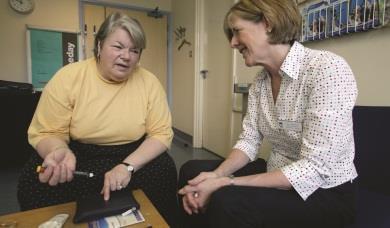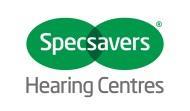One CCG’s approach to commissioning is driving up the number of people who can receive care at home. Jennifer Trueland reports

This article was part of the Audiology Today channel, in association with Specsavers Hearing Centres. The channel is no longer being updated.
North East Essex CCG is taking an innovative approach to commissioning that should see an increasing proportion of care being delivered in the community, closer to people’s homes. The idea is that the approach will deliver a higher quality, more coordinated experience for patients while helping the clinical commissioning group meet financial targets.
This includes making more use of traditional primary care services such as GP practices and high street settings for services including audiology. Steps so far include a major reprocurement of diabetic services, which is already showing improved outcomes for patients and making phlebotomy services available in primary care.
‘People ask where is the evidence for care quality in the community - but where is the evidence of that in hospitals?’
According to chief clinical officer Shane Gordon, the new approach is an important step to truly integrated services and patient wishes have been a driving force. “We’ve been engaging with patients and asking what they want from the health service. The message that came through loud and clear was that they wanted services to be delivered as locally as possible, at their GPs and in their communities,” he says.
“They wanted hospitals to be available when they needed them but wanted most care to be delivered close to home.”
None of that really came as much of a surprise to Dr Gordon, who is an experienced clinician and commissioner. The real “lightbulb moment”, however, was understanding that putting the patient experience and best interests at the centre of care makes for more effective health services.
“Sometimes someone can have great quality medical care, but a poor patient experience… we can lose sight of what’s in the patient’s best interests,” he informs.
The CCG decided to move to outcomes based commissioning with the eventual aim of giving patients a choice of end to end service providers.
Devilish problems
Diabetes was the first service to see the change. The Suffolk GP Federation won the contract to manage adult diabetes services, with a proportion of income tied to delivery of upper quartile national performance on measures including blood sugar control, cholesterol and annual checks. In its first few months, the new system saw near-immediate improvements in patient outcomes.
Dr Gordon says the challenges to moving to a new system with care provided outside hospital should not be underestimated. One of the difficulties is coming up with measurable indications of whether a patient has a good quality experience. “It’s devilishly difficult. There can be a job to be done to persuade some clinicians to embrace, or at least to go along with, change. Grown-up conversations are needed with existing providers and other stakeholder,” he says.
The proposed changes within the Care Closer to Home programme are expected to generate efficiencies, although the amount will vary from service to service. But much of the rationale for the shift comes down to common sense. “Patients were telling us that they had to go to hospital just to get new batteries for their hearing aids. That simply doesn’t make sense. People in north east Essex can now go to a variety of providers for audiology services, helping to de-medicalise the process and promote self-care,” informs Dr Gordon.
Overriding concern
This is something that is all too familiar to Harjit Sandhu, head of policy at the National Community Hearing Association. “When you talk about transferring services to the community, very often people will raise concerns about quality of care in the community, and ask where the evidence is. But I would ask — where is the evidence of quality of care in hospitals? I think there’s a status quo bias, and that could be one of the barriers to a move to community based commissioning.
“In audiology, the majority of GP referrals are still to hospital, despite evidence supporting the benefits of providing hearing services in a community based setting,” he says.
“Transformational change is needed – we need leadership, and someone to finish the job,” Dr Sandhu adds. “Patients greatly value care closer to home, regardless of whether it’s hearing [services] or other forms of care. The challenge is making this major shift in a wholesale way.”
He believes there are a lot of factors in favour of change - not least the comments this summer from NHS England chief executive Simon Stevens, who called for greater local flexibility in services.
Mr Sandhu adds that the traditional model puts barriers in the way of patients, and makes them less likely to access care, storing up problems - and building up costs - for the NHS in the future.
Calls for escalation
The approach being taken in north east Essex chimes with that outlined in a report last month published by the NHS Alliance. Think Big, Act Now: Creating a Community of Care wants to see a more integrated model of care that aligns patient need, professional practice and the wider health system.
Launching the report, NHS Alliance chair Michael Dixon said that primary care was facing a “perfect storm” and that change was coming whether or not it is wanted. “We want to see change by design, rather than by default,” he added.
‘Almost everyone is in agreement that we’ve got to get more care out of hospital. We’ve got this large cohort of frail, older people and we need souped up local services to care for them’
Importantly, the report recommends reframing the definition of primary care to include all healthcare delivered outside hospital, and calls for greater use of community premises to support the kind of care that patients want and need.
Speaking to HSJ, Dr Dixon said that one of the biggest barriers to shifting more care to the community was finance. “We want to see general practice at scale, but that is hindered by how little money there is in the system.
“Almost everyone is in agreement that we’ve got to get more care out of hospital. We’ve got this large cohort of frail, older people and we need souped up local services to care for them.”
He adds that CCGs that are in financial difficulties are facing a particular challenge in driving change while hospitals - also facing a budget squeeze - are reluctant to “lose” services, and the funding that goes with them, to the community.
Dr Dixon is optimistic to an extent. “My first wish would be that these issues were recognised ‘on high’, and I think that they are now,” he says. “But we need a proper policy of implementation. At the moment there are blocks in the system and this needs to change.”
Colin Campbell on hearing services

Systems failure in traditional NHS adult hearing services has been a chronic problem, with delayed access in the 1980s, suboptimal technology and service in the 1990s, waiting times of more than two years in 2007 and serious gaps in the follow-up of patients in 2011.
Commissioning adult hearing services from community providers has been an undoubted success for adult hearing care. It has led to:
- better outcomes: 90 per cent of patients use their hearing aid technology after one year;
- better timely access to care close to people’s homes;
- high patient satisfaction: more than 95 per cent of patients were satisfied with the service;
- better value care provided at better quality and lower costs for NHS commissioners, patients and populations; and
- reduced inequalities, opening up to NHS patients convenient, high quality, accessible care and choice previously only available to those who could pay.
Specsavers has taken the first steps towards delivering audiology services as a primary care service at scale. The ongoing transformation of this service is in direct response to patient need and the needs of clinical commissioning groups to deliver outcome based services and achieve value for money at a time when budgetary constraints are a reality across all services.
It is on this basis that Specsavers is committed to community hearing care. There is no other clinical but non-medical service that is currently delivered at such scale in acute hospitals that could be so readily delivered in the community, at lower marginal cost to the NHS, while also improving outcomes. The barrier to this is helping CCGs understand the true marginal cost of delivering this service in hospital and to change the commissioning culture from activity (in hospitals) to outcomes (in communities).
Age related hearing loss is a clinical, but not medical, condition and has not required NHS ear, nose and throat referral since the 1980s. Prior to this and since, private patients have always been able to access audiology services for age related hearing loss in the community from registered professionals without GP referral. There is abundant evidence from the private service that hearing care for such patients can be safely and effectively delivered in a community setting, out of hospital.
Since its inception in 2003, Specsavers Hearcare has grown to be the largest independent provider of NHS hearing services in England, with more than 500,000 patient contacts in the last year.
Colin Campbell is director of professional services, Specsavers Hearing Centres


























1 Readers' comment